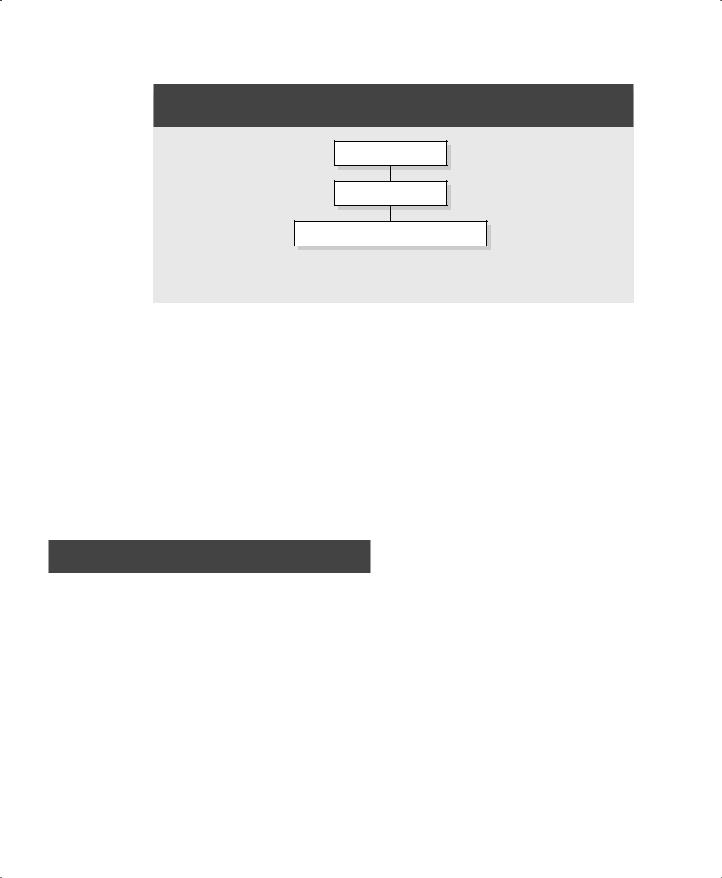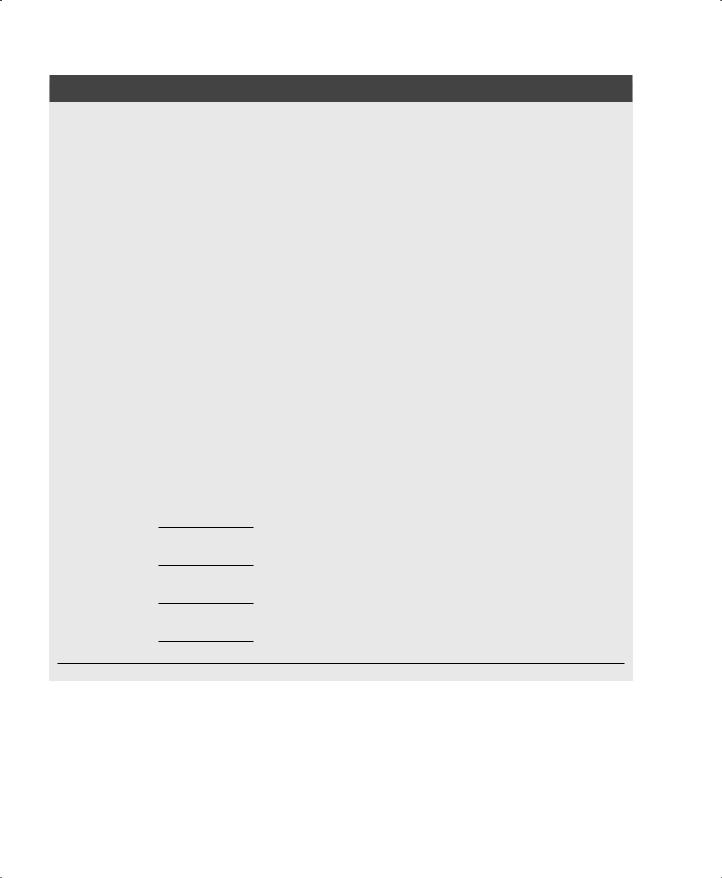
- •Contents
- •Preface
- •Acknowledgments
- •Founders of the Hotel Industry
- •E. M. Statler
- •Conrad Hilton
- •Cesar Ritz
- •William Waldorf Astor and John Jacob Astor IV
- •Kemmons Wilson
- •Ernest Henderson and Robert Moore
- •Ray Schultz
- •Historical Developments
- •Atrium Concept
- •Select-Service Hotels
- •Technological Advances
- •Marketing Emphasis
- •Total Quality Management
- •Major Reorganization, 1987–1988
- •Hotel Investment
- •September 11, 2001
- •Economic Downturn of the Late 2000s
- •Overview of the Hotel Industry
- •Types of Lodging Facilities
- •Hotels
- •Motels
- •All-suites
- •Select-service Hotels
- •Extended-stay Hotels
- •Market Orientation
- •Sales Indicators
- •Occupancy
- •Average Daily Rate (Average Room Rate)
- •Yield Percentage
- •RevPAR (Revenue per Available Room)
- •Levels of Service
- •Business Affiliations
- •Chain Affiliation
- •Referral Property
- •Company-owned Property
- •Management Contract Property
- •Brands
- •Independent Properties
- •Trends That Foster Growth
- •Leisure Time
- •The Me/Pleasure Concept
- •Discretionary Income
- •Family Size/Household Size
- •Business Travel
- •Female Business Travel
- •Travel as Experience
- •Career Development
- •Educational Preparation
- •Work Experience
- •Professional Memberships
- •Ports of Entry
- •Researching Growth Areas in the Hospitality Industry
- •Solution to Opening Dilemma
- •Chapter Recap
- •End-of-Chapter Questions
- •Notes
- •Key Words
- •Organization of Lodging Properties
- •Organization Charts
- •Typical Job Responsibilities of Department Managers
- •General Manager
- •Assistant General Manager
- •Food and Beverage Director
- •Physical Plant Engineer
- •Executive Housekeeper
- •Human Resources Manager
- •Marketing and Sales Director
- •Front Office Manager
- •Controller
- •Director of Security
- •Parking Garage Manager
- •Organization of the Front Office Department
- •Typical Front Office Organization
- •Select-service Hotel Front Office Organization
- •Function of the Front Office Manager
- •Job Analysis and Job Description
- •The Art of Supervising
- •Staffing the Front Office
- •Solution to Opening Dilemma
- •Chapter Recap
- •End-of-Chapter Questions
- •Key Words
- •Role of the Front Office in Interdepartmental Communications
- •Front Office Interaction with Other Departments in the Hotel
- •Marketing and Sales Department
- •Housekeeping Department
- •Food and Beverage Department
- •Banquet Department
- •Controller
- •Maintenance or Engineering Department
- •Security Department
- •Human Resources Management Department
- •Analyzing the Lines of Communications
- •Situation 1: Marketing and Sales Knows It All—But Didn’t Tell Us
- •Situation 2: Peace and Harmony in 507
- •Situation 3: I Know What You Said, and I Think I Know What You Mean
- •The Role of Total Quality Management in Effective Communication
- •An Example of Total Quality Management in a Hotel
- •Solution to Opening Dilemma
- •Chapter Recap
- •End-of-Chapter Questions
- •Key Words
- •Physical Structure and Positioning of the Front Desk
- •Guest First Impression
- •Creating a Balance Between Guest Flow and Employee Work
- •Selecting a Property Management System
- •Importance of a Needs Analysis
- •Procedure for Performing a Needs Analysis
- •Selecting a Team
- •Analyzing the Flow of Guests through the Hotel
- •Communicating Information
- •Reviewing Administrative Paperwork
- •Management Review of Information
- •Evaluate Needs That Have Been Identified
- •Assessing Needs Based on Findings
- •Choosing Software
- •Choosing Hardware
- •Other PMS Selection Considerations
- •Vendor Claims
- •Hardware Installation Plans
- •Computer Training Programs
- •Backup Power Sources
- •Maintenance Agreement
- •Financial Considerations
- •PMS Applications
- •Reservations
- •Revenue Management
- •Registration
- •Room Status
- •Posting
- •Call Accounting
- •Checkout
- •Night Audit
- •Inquiries/Reports
- •Back Office
- •Housekeeping
- •Food and Beverage
- •Maintenance
- •Security
- •Marketing and Sales
- •Personnel
- •Electronic Mail
- •Time Clock
- •Solution to Opening Dilemma
- •Chapter Recap
- •End-of-Chapter Questions
- •Notes
- •Key Words
- •Importance of a Reservation System
- •Overview of the Reservation System
- •Choice Hotels International
- •Hilton Hotels
- •Marriott International
- •Global Distribution Systems (GDS) in Securing Reservations
- •Role of the Internet in Securing Reservations
- •Background on Room Rates Offered via the Internet
- •Effect of Internet on Pricing Rooms
- •Consumers Response to Use of the Internet—Third-Party Websites
- •Social Media
- •Financial Effects of Third-Party Reservations
- •Types of Reservation Systems
- •Franchisee
- •Referral Member
- •Sources of Reservations
- •Corporate Clients
- •Social/Military/Educational/Religious/Fraternal (SMERF)
- •Meetings/Incentive/Conference/Event (MICE)
- •Group Travelers
- •Leisure Travelers
- •Current Guests
- •Forecasting Reservations
- •Overbooking (Occupancy Management)
- •Revenue Management
- •Processing Guest Reservations
- •Systemwide Reservation Systems
- •Outsourcing Reservations
- •Types of Reservations
- •Reservation Codes
- •Cancellation Codes
- •Blocking Procedure
- •Process of Completing Reservations through a PMS
- •Database Interfaces
- •True Integration
- •Solution to Opening Dilemma
- •Chapter Recap
- •End-of-Chapter Questions
- •Notes
- •Key Words
- •Occupancy Percentage
- •Average Daily Rate
- •RevPAR
- •History of Yield Management
- •Use of Yield Management
- •Revenue Manager
- •Components of Revenue Management
- •Definition of Yield
- •Optimal Occupancy and Optimal Rate
- •Strategies
- •Forecasting
- •Star Report
- •Block-out Periods
- •Systems and Procedures
- •Channel Management
- •Feedback
- •Management Challenges in Using Revenue Management
- •Considerations for Food and Beverage Sales
- •Applications of Revenue Management
- •Scenario 1
- •Scenario 2
- •Scenario 3
- •Solution to Opening Dilemma
- •Chapter Recap
- •End-of-Chapter Questions
- •Notes
- •Key Words
- •Importance of the First Guest Contact
- •Components of the Registration Process
- •Capturing Guest Data
- •Guest Registration Procedure
- •Guest Hospitality
- •Inquiry about Reservation
- •Completion of Registration Card
- •Review Completeness of Registration Card
- •Extension of Guest Credit
- •Room Selection
- •Room Assignment from Inventory
- •Assigning Room Rates
- •Discuss Sales Opportunities
- •Assigning Room Keys
- •Security of the Key System
- •Maintaining the Key System
- •Registration with a PMS
- •Retrieving Reservation Form
- •Checking Room Inventory Option
- •Checking Room Status Option
- •Verifying Room Rate
- •Issuing Room Key
- •Obtaining Reports from the PMS
- •Self-Check-In
- •Solution to Opening Dilemma
- •Chapter Recap
- •End-of-Chapter Questions
- •Notes
- •Key Words
- •Common Bookkeeping Practices
- •Debits and Credits
- •Forms Used to Process Guest Charges and Payments
- •Folio, Transfers, and Paid-out Slips
- •Account Ledgers
- •Guest Ledger and City Ledger
- •Posting Guest Charges and Payments
- •Point-of-sale
- •Room and Tax
- •Transfers and Adjustments
- •Paid-Out
- •Miscellaneous Charges
- •Phone
- •Display Folio
- •Reports
- •Transferring Guest and City Ledgers to Accounts Receivable
- •Solution to Opening Dilemma
- •Chapter Recap
- •End-of-Chapter Questions
- •Key Words
- •Organizing Late Charges to Ensure Accuracy
- •Guest Checkout Procedure
- •Inquiring about Quality of Products and Services
- •Retrieving the Room Key
- •Retrieving and Reviewing the Folio
- •In-room Guest Checkout
- •Determining Method of Payment and Collection
- •Credit Cards
- •Bill-to-account (Direct Billing)
- •Cash and Personal Checks
- •Traveler’s Checks
- •Debit Cards
- •Assisting the Guest with Method of Payment
- •Money Wire
- •Travelers Aid Society
- •Auto Clubs
- •International Currency Exchange
- •Obtaining Future Reservations
- •Filing Documents
- •Relaying Guest Departures to Other Departments
- •Removing Guest Information from the System
- •Transfer of Guest Accounts to the Back Office
- •Checkout Reports Available with a Property Management System
- •Guest Histories
- •ZIP Code or Postal Code
- •Developing Conventions and Conferences
- •FAM Tours
- •Origination of Reservation
- •Frequency of Guest Visit
- •Types of Room Requested
- •Room Rates versus Occupancy Patterns
- •Tracking Social Media
- •Last Impressions of the Hotel
- •Solution to Opening Dilemma
- •Chapter Recap
- •End-of-Chapter Questions
- •Notes
- •Key Words
- •Importance of the Night Audit
- •The Night Auditor
- •The Night Audit Process
- •Posting Room and Tax Charges
- •Assembling Guest Charges and Payments
- •Reconciling Departmental Financial Activities
- •Reconciling Accounts Receivable
- •Running the Trial Balance
- •Goal of Preparing the Night Audit Report
- •Preparing the Night Audit Report
- •Departmental Totals
- •Bank Deposit
- •Accounts Receivable
- •Cashier’s Report
- •Manager’s Report
- •Formulas for Balancing the Night Audit Report
- •Room and Tax
- •Total Restaurant Sales and Sales Tax
- •Tips for Restaurant, Room Service, Banquet, and Lounge Employees
- •Room Service
- •Banquet Sales
- •Banquet Bar and Total Lounge Sales
- •Room Rental
- •Valet
- •Telephone Charges
- •Gift Shop Sales and Tax
- •Vending
- •Parking
- •Total Revenue and Total Write-Offs
- •Cash Sales and Accounts Receivable Balance
- •Credit Cards and Cash Applied to Accounts Receivable
- •Analysis of Accounts Receivable
- •Bank Deposit and Amount Transferred to Accounts Receivable
- •Cashier’s Report
- •Operating Statistics
- •Daily Flash Report
- •Reading the Flash Report
- •Reading the Night Audit
- •Solution to Opening Dilemma
- •Chapter Recap
- •End-of-Chapter Questions
- •Key Words
- •Importance of Hospitality
- •Managing the Delivery of Hospitality
- •Management’s Role
- •The Service Strategy Statement
- •Financial Commitment
- •Total Quality Management Applications
- •Developing a Service Management Program
- •Guest Cycle
- •Moments of Truth in Hotel Service Management
- •Employee Buy-in Concept
- •Screening Employees Who Deliver Hospitality
- •Empowerment
- •Training for Hospitality Management
- •Evaluating the Service Management Program
- •Follow-through
- •Interfacing with Other Departments in Delivering Hospitality
- •Customer Relationship Management
- •Solution to Opening Dilemma
- •Chapter Recap
- •End-of-Chapter Questions
- •Notes
- •Key Words
- •Determining Employee Hospitality Qualities
- •Job Analysis and Job Descriptions
- •Positive Hospitality Character Traits
- •Practicing Promotional Skills
- •Screening for Hospitality Qualities
- •An Outgoing Personality
- •Patience
- •Ability to Accept Constructive Criticism
- •Interest in Selling
- •Developing an Orientation Program
- •Economic Position of the Property in the Community
- •Overview of the Lodging Establishment
- •Employee Handbook
- •Policy and Procedure Manual
- •Introduction to the Front Office Staff
- •Equipment Overview
- •Interdepartmental Cooperation
- •Administering the Orientation Program
- •Selection of Orientation Leader
- •Developing a Training Program
- •Identification of Tasks and Job Management Skills
- •Preparing Step-by-Step Procedures
- •Management Concepts
- •Steps in the Training Process
- •Preparation: Get Ready
- •Delivery: Show Me
- •Administering a Training Program
- •Cross-training
- •Developing a Trainer
- •Job Knowledge
- •Training for Empowerment
- •Americans with Disabilities Act
- •Solution to Opening Dilemma
- •Chapter Recap
- •End-of-Chapter Questions
- •Notes
- •Key Words
- •The Role of the Front Office in Marketing and Sales
- •Planning a Point-of-sale Front Office
- •Set Objectives
- •Brainstorm Areas for Promotion
- •Evaluate Alternatives
- •Devise Incentive Programs
- •Theories of Motivation
- •Douglas McGregor
- •Abraham Maslow
- •Elton Mayo
- •Frederick Herzberg
- •Applying Motivation Theories
- •Maslow
- •Mayo
- •Herzberg
- •Training Programs for a Point-of-sale Front Office
- •Train in Sales Skills
- •Develop an Attitude of Presenting Opportunities
- •Let Employees Experience Hotel Services
- •Use Role-Playing to Create Your Own Training Video
- •Budgeting for a Point-of-sale Front Office
- •Feedback
- •Guest Test
- •Financial Results
- •Planning a Point-of-sale Front Office—An Example
- •Solution to Opening Dilemma
- •Chapter Recap
- •End-of-Chapter Questions
- •Notes
- •Key Words
- •Importance of a Security Department
- •Organization of a Security Department
- •Job Analysis of the Director of Security
- •In-House Security Departments versus Contracted Security
- •Room Key Security
- •Hard-key System
- •Electronic Locks System
- •Smart Card
- •Contactless Electronic Locks
- •Fire Safety
- •General Fire Code Requirements
- •Guest Expectations
- •Fire Safety Plan
- •Employee Training in Fire Safety
- •Guest Instruction in Fire Safety
- •Fire Action Communication Procedure
- •Emergency Communication
- •Developing the Emergency Communication Plan
- •Employee Safety Programs
- •Employee Safety Committee
- •Composition and Activities of the Safety Committee
- •Department Supervisors’ Responsibility
- •Safety Training Programs
- •Solution to Opening Dilemma
- •Chapter Recap
- •End-of-Chapter Questions
- •Notes
- •Key Words
- •Importance of the Housekeeping Department
- •Overview of a Housekeeping Department
- •Relationship of the Executive Housekeeper to the General Manager
- •Management of a Housekeeping Department
- •Room Assignment/Workload
- •Outsourcing Housekeeping Activities
- •Housekeeper’s Report
- •Communication
- •Situation 1: Why Can’t Room Attendants Get Those Rooms Cleaned More Quickly, or, If That Guest Asks One More Time…
- •Inventory Control
- •Fixtures
- •Theft Control of Inventory
- •In-house Laundry versus Outsourced Laundry
- •Occupational Safety and Health Administration
- •Material Safety Data Sheets
- •Americans with Disability Compliance
- •Professional Associations
- •Role of Chief Engineer in a Lodging Property
- •Job Analysis
- •Job Description
- •Technology
- •Managing Maintenance Inter-departmental Communications
- •Energy Management
- •The Greening of the Lodging Industry
- •Leadership in Energy and Environmental Design (LEED)
- •Solution to Opening Dilemma
- •Chapter Recap
- •End-of-Chapter Questions
- •Notes
- •Key Words
- •Glossary
- •Index

62 C H A P T E R 2 ■ H O T E L O R G A N I Z AT I O N A N D T H E F R O N T O F F I C E M A N A G E R
F I G U R E 2 - 7 The front office staff in a select-service hotel includes a minimal
number of employees.
Corporate Owner
General Manager
Front Office Manager
|
|
|
|
|
|
|
|
Night Auditor |
|
|
Desk Clerks |
||
|
|
|
|
|
|
|
|
|
|
|
|
|
|
professionalism. In select-service properties, the general manager may also assist, when needed, to process reservation requests, check guests in upon arrival, and check guests out upon departure.
The night auditor’s role in a select-service property is unlike that of his or her counterpart in a full-service hotel. Because there are usually no departmental transactions from restaurants, banquets, lounges, gift shops, or spas, the night auditor is mainly concerned with posting room and tax charges and preparing statistics for the hotel. With the utilization of computer technology, the completion of the night audit has been reduced to a minimum of time. As previously mentioned, this task may be performed early in the morning prior to guest checkouts.
Function of the Front Office Manager
A successful front office manager conveys the spirit of a particular lodging property to the customer. By applying management principles, he or she works through the front office staff to communicate feelings of warmth, caring, safety, and efficiency to each guest. The front office manager must train personnel in the technical aspects of the property management system (PMS), a hotel computer system that networks the software and hardware used in reservation and registration databases, point-of-sale systems, accounting systems, and other office software. He or she also must maintain the delicate balance between delivery of hospitality and service and promotion of the profit centers, and maintain the details of the communication system.
The front office manager has at his or her disposal the basic elements of effective management practice: employees, equipment, inventory (rooms to be sold), a budget, and sales opportunities. This manager is responsible for coordinating these basic elements to achieve the profit goals of the lodging property.

F U N C T I O N O F T H E F R O N T O F F I C E M A N A G E R 63
Front office employees must be trained properly to function within the guidelines and policies of the lodging establishment. The front office manager cannot assume that an employee knows how to do certain tasks. Every employee needs instruction and guidance in how to provide hospitality; front office employees’ attitudes are of utmost importance to the industry. To ensure the proper attitude prevails, employers must cultivate an atmosphere in which employees are motivated to excel and that nurtures their morale and teamwork.
The property management system gives the front office manager an unlimited opportunity for managerial control. He or she can easily track information such as ZIP codes of visitors, frequency of visits by corporate guests, and amount of revenue a particular conference generated, and pass this information on to the marketing and sales department.
An unsold guest room is a sales opportunity lost forever. This is one of the major challenges of the front office manager. Cooperation between the marketing and sales department and the front office is necessary to develop profitable advertising and point-of-sale strategies. The subsequent training of front office personnel to seize every opportunity to sell vacant rooms helps ensure the financial goals of the lodging property are met.
Budgetary guidelines must be developed by the front office manager and the general manager, as the front office manager does have a large dollar volume under his or her control. The budgeting of money for payroll and supplies, the opportunity for improving daily sales, and accurate recording of guest charges require the front office manager to apply managerial skills.
The foremost concept that characterizes a front office manager is team player. The front office manager does not labor alone to meet the profit goals of the lodging property. The general manager sets the goals, objectives, and standards for all departments to follow. The assistant manager offers the department heads additional insight into meeting the operational needs of the establishment. The controller supplies valuable accounting information to the front office manager as feedback on current performance and meeting budgetary goals. The food and beverage manager, housekeeper, and plant engineer provide essential services to the guest. Without cooperation and communication among these departments and the front office, hospitality cannot be delivered. The director of marketing and sales develops programs to attract guests to the lodging property. These programs help the front office manager sell rooms. The human resources manager completes the team by providing the front office with competent personnel to accomplish the goals, objectives, and standards set by the general manager.
Job Analysis and Job Description
A job analysis, a detailed listing of the tasks of a job, provides the basis for a sound job description. A job description is a listing of required duties to be performed by an employee in a particular position. Although almost nothing is typical in the lodging industry, certain daily tasks must be performed. A job analysis is useful in that it allows the person preparing the job description to determine certain daily procedures. These procedures, along with typical responsibilities and interdepartmental relationships

64 C H A P T E R 2 ■ H O T E L O R G A N I Z AT I O N A N D T H E F R O N T O F F I C E M A N A G E R
involved in a job, form the basis for the job description. The future professional will find this management tool helpful in preparing orientation and training programs for employees. It also helps the human resources department ensure each new hire is given every opportunity to succeed.
The following is the job analysis of a typical front office manager:
7:00 a.m. |
Meets with the night auditor to discuss the activities of the previous |
|
night. Notes any discrepancies in balancing the night audit. |
7:30 |
Meets with the reservation clerk to note the incoming reservations for |
|
the day. |
8:00 |
Greets the first-shift desk clerks and passes along any information from |
|
the night auditor and reservation office. Assists desk clerks in guest |
|
checkout. |
8:30 |
Meets with the housekeeper to identify potential problem areas of which |
|
the front office staff should be aware. Meets with the plant engineer to |
|
identify potential problem areas of which the front office staff should be |
|
aware. |
9:00 |
Meets with the director of marketing and sales to discuss ideas for |
|
potential programs to increase sales. Discusses with the banquet manager |
|
details of groups that will be in-house for banquets and city ledger |
|
accounts that have left requests for billing disputes. |
9:30 |
Checks with the chef to learn daily specials for the various restaurants. |
|
This information will be typed and distributed to the telephone |
|
operators. |
9:45 |
Meets with the front office staff to discuss pertinent operational |
|
information for the day. Handles guest billing disputes. |
11:00 |
Meets with the general manager to discuss the development of the next |
|
fiscal budget. |
12:30 p.m. |
Works on forecasting sheet for the coming week. Prepares preliminary |
|
schedule and anticipated payroll. |
1:30 |
Has a lunch appointment with a corporate business client. |
2:15 |
Works on room blocking—reserving rooms for guests who are holding |
|
reservations—for group reservations with the reservations clerk. |
2:30 |
Works with the controller on budgetary targets for the next month. |
|
Receives feedback on budget targets from last month. Checks with the |
|
housekeeper on progress of room inspection and release. |
2:45 |
Checks with the plant engineer on progress of plumbing repair for the |
|
eighteenth floor. |
3:00 |
Greets the second-shift desk clerks and relays operational information on |
|
reservations, room assignments, room inventory, and the like. |

|
F U N C T I O N O F T H E F R O N T O F F I C E M A N A G E R 65 |
3:15 |
Assists the front desk clerks in checking in a tour group. |
4:00 |
Interviews two people for front desk clerk positions. |
4:45 |
Assists the front desk clerks in checking in guests. |
5:15 |
Reviews trade journal article on empowerment of employees. |
5:45 |
Telephones the night auditor and communicates current information |
|
pertinent to tonight’s audit. |
6:00 |
Checks with the director of security for information concerning security |
|
coverage for the art exhibit in the ballroom. |
6:30 |
Completes work order request forms for preventive maintenance on the |
|
front office posting machine. |
6:45 |
Prepares “things to do” schedule for tomorrow. |
This job analysis reveals that the front office manager has a busy schedule involving hands-on participation with the front office staff and communication with department heads throughout the lodging establishment. The front office manager must be able to project incomes and related expenses, to interview, and to interact with potential business clients.
Based on this job analysis, a job description for a front office manager is easily prepared, as shown in Figure 2-8. The job description is an effective management tool because it details the tasks and responsibilities required of the job holder. These guidelines allow the individual to apply management principles in the development of an effective front office department. They also challenge the person in the job to use prior experience and theoretical knowledge to accomplish the tasks at hand.
The Art of Supervising
The art of supervising employees encompasses volumes of text and years of experience. Management experts have analyzed the complexities of supervising employees. Some of your other management courses explain this vital management responsibility in detail. This chapter covers a few concepts that will assist you in developing your own supervisory style.
The first step in developing a supervisory style is to examine the manager’s position in the context of the management team. As the front office manager, you are assigned certain responsibilities and granted certain areas of authority. These are areas for participation, growth, and limitation on and in the management team. Although this is a simplified overview of the management team, it does help clarify intended managerial performance.
Early in his or her new job, a manager should review personal career goals with this organization. The ports of entry to the position of general manager (described in chapter 1) will help an aspiring general manager clarify goals and understand which areas of the hotel will provide good exposure and experience. Once you have clarified your arena of participation and plan for growth, you can decide how best to lead a team to financial success and personal growth.

66 C H A P T E R 2 ■ H O T E L O R G A N I Z AT I O N A N D T H E F R O N T O F F I C E M A N A G E R
F I G U R E 2 - 8 The job description is based on the job analysis of a front office manager.
JOB DESCRIPTION
Title: Front Office Manager
Reports to: General Manager
Typical duties:
1.Reviews final draft of night audit.
2.Operates and monitors reservation system for guest room rentals.
3.Develops and operates an effective communication system with front office staff.
4.Supervises daily operation of front office staff—reservations, registrations, and checkouts.
5.Participates with all department heads in an effective communications system facilitating the provision of guest services.
6.Plans and participates in the delivery of marketing programs for the sale of rooms and other hotel products and services.
7.Interfaces with various department heads and controller regarding billing disputes involving guests.
8.Develops final draft of budget for front office staff.
9.Prepares forecast of room sales for upcoming week, month, or other period as required.
10.Maintains business relationships with corporate community leaders.
11.Oversees the personnel management for the front office department.
12.Performs these and other duties as required.
Review cycle:
1 month
(date)
3 months
(date)
6 months
(date)
1 year
(date)
The first concept a new supervisor should address is employee motivation. What helps each employee perform at his or her best? The emphasis is on each employee; different incentives motivate different people. The better shift scheduling that motivates the second-shift desk clerk may have no effect on the part-time night auditor who is a

F U N C T I O N O F T H E F R O N T O F F I C E M A N A G E R 67
moonlighter, a person who has a full-time job at another organization and a part-time job at a hotel, two days a week on your property. The young person who prefers the second shift (3:00–11:00 p.m.) because it better fits his or her lifestyle will not be inspired by the possibility of working the first shift. Tuition reimbursement may motivate the recent graduate of an associate degree program who wants to continue toward a four-year degree; this same benefit will mean little to someone uninterested in higher education. The possibility of promotion to reservations clerk may not have the same motivating effect on a telephone operator who is a recently displaced worker concerned about a schedule that meets the needs of a young family as it does on a front desk clerk who has no dependents. Sometimes a supervisor cannot figure out what motivates a person. It is a manager’s ultimate challenge to discover how to motivate each member of his or her staff. By using this knowledge, a manager can promote not just the best interests of the employee but also the best interests of the hotel.
Another supervisory responsibility is to achieve a balance among varying personalities in a group work setting. This is a constant and evolving situation. Very often, a new supervisor does not have time to assess each employee’s relationship with others on the team, yet these dynamics are key to establishing a positive and effective team setting. The front office staff may jockey for position with the new boss; this common situation must be addressed as part of the job. Once the new supervisor shows himself or herself capable and competent, he or she can move on to the day-to-day tasks. The staff needs this time to learn their new manager’s reactions under stress. They also want to make sure their supervisor will be their advocate with top management. All new supervisors are tested in this way. You should not be discouraged by this challenge but rather embrace it as the first of many to come.
After working out whatever personality clashes exist among the employees, the manager must be objective about their strengths and weaknesses. Who is the unofficial leader of the group? Who is the agitator? Who is the complainer? Objective views of staff are probably shared by the rest of the team. Often staff members are quite aware of the shortcomings of their coworkers. They also know on whom they can rely to check out the full house and check in the convention three hours later. The unofficial leader of the group can assist the supervisor in conveying important ideas.
Some supervisors respond negatively to such accommodation of the staff. Their response is based on the assumption that the supervisor has the first and last word in all that goes on in the front office. Of course, authority is important, but any supervisor who wants to maintain authority and have objectives met by the staff must constantly rework his or her strategy.
Adequate personnel training (discussed in chapter 12) makes the job of a supervisor much easier. When training is planned, executed, and reinforced, the little annoyances of human error are minimized. As previously discussed, each job description lists the major duties of the employees, but the gray areas—handling complaints, delivering a positive image of the lodging property, selling other departments in the hotel, and covering for a new trainee—cannot be communicated in a job description. On-the-job training, employee training that takes place while producing a product or service, and

68 C H A P T E R 2 ■ H O T E L O R G A N I Z AT I O N A N D T H E F R O N T O F F I C E M A N A G E R
videotape training are excellent methods for clarifying such tasks. These methods serve not only to demonstrate skills but also to communicate the financial goals, the objectives of hospitality and service, and the idiosyncrasies of the lodging property and the people who work in it.
Employees always have special scheduling needs as well as other job-related requests, and supervisors should try to accommodate them. The new hire who made commitments four to six months prior to accepting a position at the front desk will appreciate and return a supervisor’s consideration. The individual who wants to change shifts because of difficulties with another person on the job may just need advice on how to handle that person. These individuals may make a good team, but they wear on each other’s patience. A longtime employee might ask you how he or she can advance in the organization. You may not have an immediate response, but you can indicate you will act on the request in the near future. Sometimes employees know that a good thing takes time to develop. Listen to their needs; their requests may answer your problems by fitting into the demands of the job. For example, a desk clerk who needs additional income may request overtime hours. An opportunity may arise for this employee to fill a vacancy caused by another employee’s illness or vacation.
The responsibility of communications within the hotel usually rests with the front office. From the guests’ perspective, this department is the most visible part of the lodging establishment. The various departments in the hotel realize the transfer of information to guests is best done through the front office. When such communications fail to reach guests, it is often the front office that bears the brunt of their unhappiness at checkout time.
The more systematic the communication process, the better for all concerned. For example, messages that will affect the next shift of desk clerks can be recorded in the message book, a loose-leaf binder in which the front desk staff of any shift can record important messages. This communication tool is vital to keeping all front office personnel informed of additions, changes, and deletions of information and activities that affect the operation of a front office. Additionally, daily function sheets, which list the planned events in the hotel and their updates, must be delivered routinely to the front office. The daily function board or electronic bulletin board in guest rooms, available on in-room television or in public areas, is usually maintained by the front office. The guest who complains about the maintenance of a room must have the complaint passed to the right person. The complaint is then reviewed by a member of the staff, front office manager, member of the housekeeping staff, housekeeper, member of the maintenance staff, or maintenance director to ensure it is resolved.
Inquiries about hotel services, reservations, city ledger accounts (a collection of accounts receivable of nonregistered guests who use the services of the hotel), accounts payable, scheduled events, and messages for registered guests constitute only some of the many requests for information. Desk clerks and telephone operators are expected to know the answers to these questions or to whom they should be referred.
Some of this advice is based on my own experience. One of the jobs I was responsible for as a front desk clerk included operating the switchboard. This job was truly
